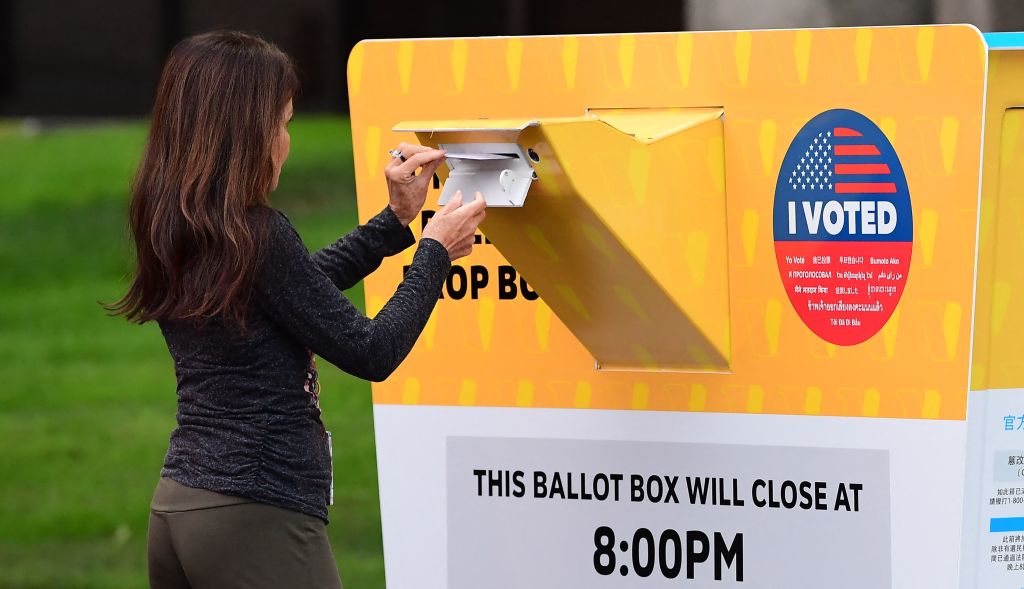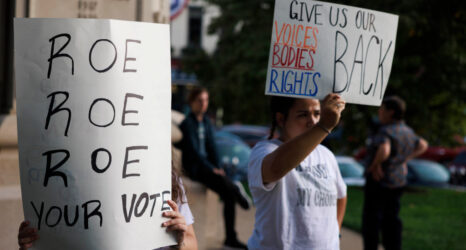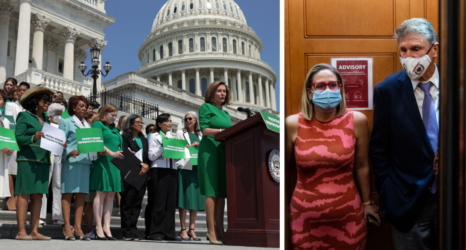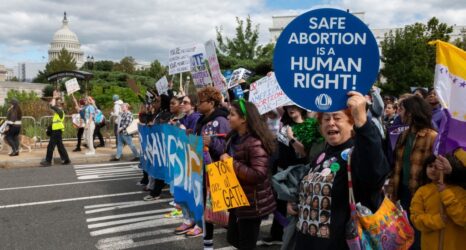In 1998, then-teenage Gabbard supported her father's successful campaign to amend the Constitution of Hawaii to give lawmakers the power to limit marriage to opposite-sex couples.[48][291] The "Alliance for Traditional Marriage" spent more than $100,000 opposing same-sex marriage.[48] In her campaign for the Hawaii legislature in 2002, when asked "What qualifies you to be a state representative?", Gabbard responded "Working with my father, Mike Gabbard, and others to pass a constitutional amendment to protect traditional marriage, I learned that real leaders are willing to make personal sacrifices for the common good. I will bring that attitude of public service to the legislature."[292] In 2019, CNN in a review of Gabbard's early career, said this showed "how closely she aligned herself with her father's mission at the time."[48]
In 2004, then-adult Gabbard led a protest outside the Hawaii House Judiciary Committee objecting to the committee's decision to hold a hearing on a bill to establish legal parity between same-sex couples in civil unions and married straight couples after voters had, in 1998, approved the constitutional amendment not to support gay marriage by a margin of more than 2-to-1.[293] In public testimony, she said: "To try to act as if there is a difference between 'civil unions' and same-sex marriage is dishonest, cowardly, and extremely disrespectful to the people of Hawaii who have already made overwhelmingly clear our position on this issue, … As Democrats, we should be representing the views of the people, not a small number of homosexual extremists."[294]
That same year, she asserted that existing harassment figures showed Hawaii's schools were "not rampant with anti-gay harassment" and opposed a planned study that asked students about their sexuality.[57]
In 2012, Gabbard apologized for her "anti-gay advocacy"[295] and said she would "fight for the repeal" of the Defense of Marriage Act (DOMA).[296] In June 2013, she was an initial cosponsor of the legislation to repeal DOMA.[297]
Gabbard was a member of the House LGBT Equality Caucus.[298] She received ratings of 92%, 88%, 100%, and 84% for her four congressional terms for pro-LGBT legislation from the Human Rights Campaign, a group that advocates for LGBT rights.[299]
After launching her presidential campaign in 2019, she apologized again[295] and said that her views had been changed by her experience in the military "with LGBTQ service members, both here at home and while deployed".[6][300] After criticism from Democrats over her past anti-gay remarks, she was defended by conservative pundit Tucker Carlson, anti-establishment progressive journalist Glenn Greenwald, and openly gay representative Sean Patrick Maloney.[301][302]
On December 10, 2020, Gabbard and Republican U.S. Representative Markwayne Mullin introduced a bill titled the "Protect Women's Sports Act" that would seek to define Title IX protections on the basis of an individual's biological sex, making it a violation for institutions that receive federal funding to "permit a person whose biological sex at birth is male to participate in an athletic program or activity that is designated for women or girls." If passed, this bill would effectively ban many transgender athletes from participating in programs corresponding with their gender identity.[303][304][305] Gabbard received condemnation from LGBT organizations and activists after introducing the bill, including the Human Rights Campaign, saying: "Gabbard has lost all credibility as an ally."[306]
On April 4, 2022, Gabbard endorsed Florida's Parental Rights Bill which forbids discussion of sexual orientation and gender identity in public school classrooms for kindergarten through third grade. Gabbard stated the bill "bans government and government schools from indoctrinating woke sexual values in our schools to a captive audience." She also suggested the bill should apply to all grades.[307][308]
"Iraq snapshot' (THE COMMON ILLS):
I saw a little lawyer on the tube
He said "It's so easy now anyone can sue"
"Let me show you how your petty aggravations can profit you!"
Call for the three great stimulants
Of the exhausted ones
Artifice brutality and innocence
Artifice and innocence
Oh and deep in the night
Appetites find us
Release us and blind us
Deep in the night
While madmen sit up building bombs
And making laws and bars
They're gonna slam free choice behind us
A grim picture of the US and Britain's legacy in Iraq has been revealed in a massive leak of American military documents that detail torture, summary executions and war crimes.
Almost 400,000 secret US army field reports have been passed to the
Guardian and a number of other international media organisations via the
whistleblowing website WikiLeaks.
The electronic archive is believed to emanate from the same dissident
US army intelligence analyst who earlier this year is alleged to have
leaked a smaller tranche of 90,000 logs chronicling bloody encounters
and civilian killings in the Afghan war.
The new logs detail how:
•
US authorities failed to investigate hundreds of reports of abuse,
torture, rape and even murder by Iraqi police and soldiers whose conduct
appears to be systematic and normally unpunished.
• A US helicopter gunship involved in a
notorious Baghdad incident had previously killed Iraqi insurgents after
they tried to surrender.
• More than 15,000 civilians died in
previously unknown incidents. US and UK officials have insisted that no
official record of civilian casualties exists but the logs record 66,081
non-combatant deaths out of a total of 109,000 fatalities.
The numerous reports of detainee abuse, often supported by medical evidence, describe prisoners shackled, blindfolded and hung by wrists or ankles, and subjected to whipping, punching, kicking or electric shocks. Six reports end with a detainee's apparent death.
Robinson’s speech, which was broadcast live on the state-funded Australian Broadcasting Corporation, contained a sharp warning on Assange’s plight and the implications of the US attempt to prosecute him.
Assange, she said, would not survive years’ more incarceration and “persecution by process.” And if he were extradited from Britain to the US and hauled before a kangaroo court for publishing true information, it would be a dagger blow to freedom of the press and democratic rights.
The address was a rare breach in a wall of silence on the Assange case in Australia. His various court dates have been given cursory coverage, but there has scarcely been any television programming or substantive reporting on the persecution of an Australian citizen and journalist.
Robinson noted that many were shocked at Assange’s appearance when he was dragged from Ecuador’s London embassy by the British police in 2019. She said that she was not, because “for seven years I had seen his health decline.”
Similarly, some were surprised when the US unveiled an indictment of Assange, and an extradition request, as soon as he was arrested. Robinson noted, however, that this was what Assange, WikiLeaks and its defenders, including herself, had been warning of for years.
“For the past three and a half years Assange has been in a maximum security prison” dubbed “Britain’s Guantanamo Bay,” Robinson noted, where his health had further declined. At a court hearing last October, she recalled that while prosecutors for the US extradition were deriding medical evidence of Assange’s deteriorating condition, viewers of the proceeding watched him slump with his head in his hands. It was later confirmed that Assange was, at that moment or just before, suffering a minor stroke, which is often a prelude to a major stroke.
“Julian’s wife Stella anxiously waits for the phone call she dreads,” Robinson said. “He is suffering profoundly in prison and she does not know if he will survive it.”
Robinson provided a brief précis of where Assange’s extradition case is up to. She explained that he had won in the first British hearings, with a District Court ruling early last year that extradition would be “oppressive” because of the conditions in which Assange would be held in the US prison system. He would be placed under “Special Administrative Measures (SAMs),” a draconian regime of complete isolation described by rights’ groups as the “darkest corner” of US penitentiaries.
Last week the attorney general, Mark Dreyfus, reiterated his view that the case against the Australian citizen had “gone on long enough” but cited private talks with the Biden administration as a reason for not commenting further.
Robinson, who has met several times with Dreyfus, said it was “encouraging” that the Albanese government was maintaining the position that it had adopted in opposition: that the case had dragged on too long and “enough is enough”.
Turkey on Thursday rejected allegations that the Turkish Armed Forces used chemical weapons against Kurdish militants in northern Iraq.
Media close to the Kurdistan Workers Party (PKK) militant group – which is considered a terrorist group by Turkey, the United States, and the European Union, among others – published videos this week showing chemical weapons being used by Turkey’s army against them.
“The chemical weapons lie is a futile attempt by those who try to whitewash and airbrush terrorism. Our fight against terrorism will continue with resolve and determination,” presidential spokesman Ibrahim Kalin said on Twitter.
Iraq hit two anniversaries this month. Three years ago in October, Iraqis rose up to protest the failure of the Iraqi government and political class in delivering basic services, providing jobs, fighting corruption and more. One of the outcomes of those protests was early elections, which were held on October 10, 2021, but have yet to yield a government. The last year witnessed crippling political gridlock, as the winner of the 2021 national parliamentary elections, Moqtada al-Sadr, eventually withdrew from the political process after failing to form a government.
Last week, Iraq’s parliament elected Abdul Latif Rashid as president, and he then named Mohammed Shia al-Sudani as prime minister-designate. Al-Sudani, who now is tasked with forming a government, is the nominee of the Coordination Framework, al-Sadr’s chief rival. Amid a year of political turmoil and three years after the protests erupted, Iraqis’ grievances remain largely unaddressed.
USIP’s Sarhang Hamasaeed discusses how we got here, what comes next in the government formation process and where Iraq’s protest movement stands three years on.
Over a year later on October 13, Iraq’s parliament voted Abdul Latif Rashid as the new president, who in turn designated Coordination Framework nominee Mohammed Shia al-Sudani as prime minister. Nine rockets hit the vicinity of the parliament and other parts of Baghdad as the voting occurred, but it did not stop the process. With 30 days to form a government and win a vote of confidence from the parliament, al-Sudani is negotiating with other political parties to form his government and projects confidence in his actions and messages. He has also welcomed the Sadrists’ participation in the government, but that’s unlikely to happen.
This breakthrough was made possible because al-Sadr gave up all his bloc’s parliamentary seats and his attempt of applying public pressure through the street — occupying the parliament building and judiciary headquarters — backfired. The Coordination Framework replaced al-Sadr’s MPs with their own, nominated al-Sudani to become prime minister, and reached agreement with Kurdish and Sunni Arab allies of al-Sadr — whom al-Sadr has freed from commitments they made to him — to support their candidate.
The Coordination Framework, which now holds the highest number of Shia seats in the parliament, has come together with most Kurdish and Sunni MPs under a new coalition called the State Administration Coalition (Itilaf Idarat al-Dawla). They have sufficient votes and seem to have established enough foundation for a government to finally form. Regional and international interlocutors, including the United States and European allies, have welcomed the government formation process moving forward. However, there continues to be apprehension about what al-Sadr might do next: Will he challenge the formation of the cabinet? Will he wait until a government is formed and then challenge it? Or will he move on and focus on the next elections?
Ancient rock carvings that are believed to be more than 2,700 years old have been unearthed by a team of archaeologists in Iraq's northern city of Mosul.
The marble slabs were found during restoration work on the Mashki Gate, an ancient monument that was partially destroyed by Islamic State militants when they captured the city in 2016.
The relief carvings show scenes of war from the rule of Assyrian kings, in the ancient city of Nineveh, the Iraqi State Board of Antiquities and Heritage said in a statement Wednesday.













